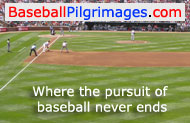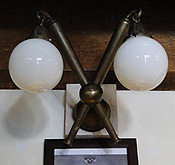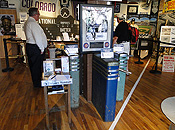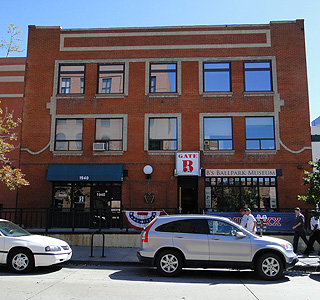
|
Bruce Hellerstein is his name and Bís Ballpark Museum is his baseball claim to fame. As the curator and collector of the items in the museum that was long his dream and bears his single letter nickname, Bruce moved ďBísĒ into a permanent location a half-block from Coors Fieldís main entrance in July of 2010. Previously, the Hellerstein household in the suburb of Centennial contained the collection that was recognized by Smithsonian Books as one of the 21 finest private baseball collections in the world. The move from Bruceís basement to near Coorsí rotunda was appropriate, given that he was on the Coors Field Design Committee and was the driving force behind the Ebbets Field-inspired entry that is within eyeshot of the authentic Fenway Park ďGate BĒ sign that calls attention to the museum, which was officially organized as a non-profit organization in 1999. Full of ballpark artifacts that are undoubtedly unique, the stated mission of the museum is ďto pass on the passion and love for our National Pastime and its ballparks." That mission is accomplished in approximately 2,000-square feet of space that is split between a museum and library, each primarily focused on the history of the green cathedrals past and present where baseball has been most notably played, which is at the major league level. Dedicated to ballparks forever, but specifically honoring the 13 "classics" that were constructed between 1909-1915 and the "majestic" Yankee Stadium built in 1923, B's Ballpark Museum contains a treasure trove of memorabilia from the most hallowed of grounds, such as the complete collection of classic ballpark bricks and seats that were used in each of them. But it's the one-of-a-kind items you wouldnít expect to find that truly make the ballpark museum's memorabilia memorable. Highlights include the Yankee Stadium drain pipe cover that was responsible for tearing up Mickey Mantle's knee in the 1951 World Series, when it was hidden in the outfield grass. Now it hangs upon one of the museum's walls, in plain view for all to see. Helping to illuminate the room is a vintage heirloom from Ebbets Field, as the only surviving light fixture from the fabled Brooklyn ballparkís grand rotunda is stationed above the entrance to the museumís conference room. Like the museum itself, the meeting room can be rented out by groups for special occasions. Admission for individuals to the museum is a mere five bucks. Regular hours, however, arenít yet maintained, as Hellerstein is a certified public accountant during the day Ė his office and the museum are actually housed in the same building Ė so prospective visitors should first visit the museumís Web site, www.ballparkmuseum.com, to see operating hours. These often correspond to the Rockiesí home schedule when, prior to game time, either Bruce, his wife Lynn or a volunteer handles the tours. During the offseason, the museum is generally only open by appointment. Eventually, the hope of its founder is that enough qualified volunteers will enable it to be open year-round or at least for regular hours during the baseball season. For the partial season that corresponded with the museumís Denver debut, a native New Yorker named Vince became Bís initial volunteer. Bruce himself is a third-generation Denver native and his love for baseball in his home state is on display on the east side of the museum, where tributes to Coloradoís most notable pre-Coors Field ballparks have their own exhibit. Most prominently, the Denver Bears and their ballpark, which evolved into Mile High Stadium and the original home of the Rockies, are extensively, and lovingly, detailed. The Bears were the cityís longtime Triple-A team and the one that hooked Hellerstein on the sport. Aside from the local tribute, the rest of the floor space in the museumís primary room is dedicated to major league ballparks with some general baseball memorabilia a part of the mix. Ballpark photos, pennants and models coexist with usher uniforms from Crosley Field and Tiger Stadium, a replica of Wrigley Fieldís scoreboard, and a real on-deck circle from Cal Ripken, Jr.ís final season. Turnstiles from the three classics most fans are familiar with -- Fenway, Wrigley and Yankee Ė greet those who enter, and those three ballparks are most visibly represented in the museum. Baseball and ballpark books galore can be found in Bís library. Hellerstein often visits book stores looking to add to the bounty he already has on the subjects. Opposite the bookshelf that contains most of them is a makeshift Rolodex of stadium postcards. Lining the libraryís narrow hallway is autographed artwork of ballparks. "For the love of Sportsman's Park at B's Ballpark Museum," penned Stan Musial on the print of the place where "The Man" played his entire Hall of Fame career. Visitors to Bís Ballpark Museum will surely love the place that contains too many artifacts to count. The building they are housed in is also notable in its own right, as it was built the same year that Babe Ruth was born: in 1895. The three-story brick structure with exposed interior walls and hardwood floors will be the long-time home of the collection that had been in Hellerstein's home after Bruce and his wife purchased the space in which it now resides. So while ballparks continue to come and go, Bís Ballpark Museum has found a place to stay in Denverís Lower Downtown Historic District, where fittingly enough the lowdown on ballpark history is across the street from a ballpark where history is still made. Indeed, both the museum and Coors Field are found on Blake Street, making the location a destination that is truly ballpark nirvana.
| ||||||||||||||||||||||




